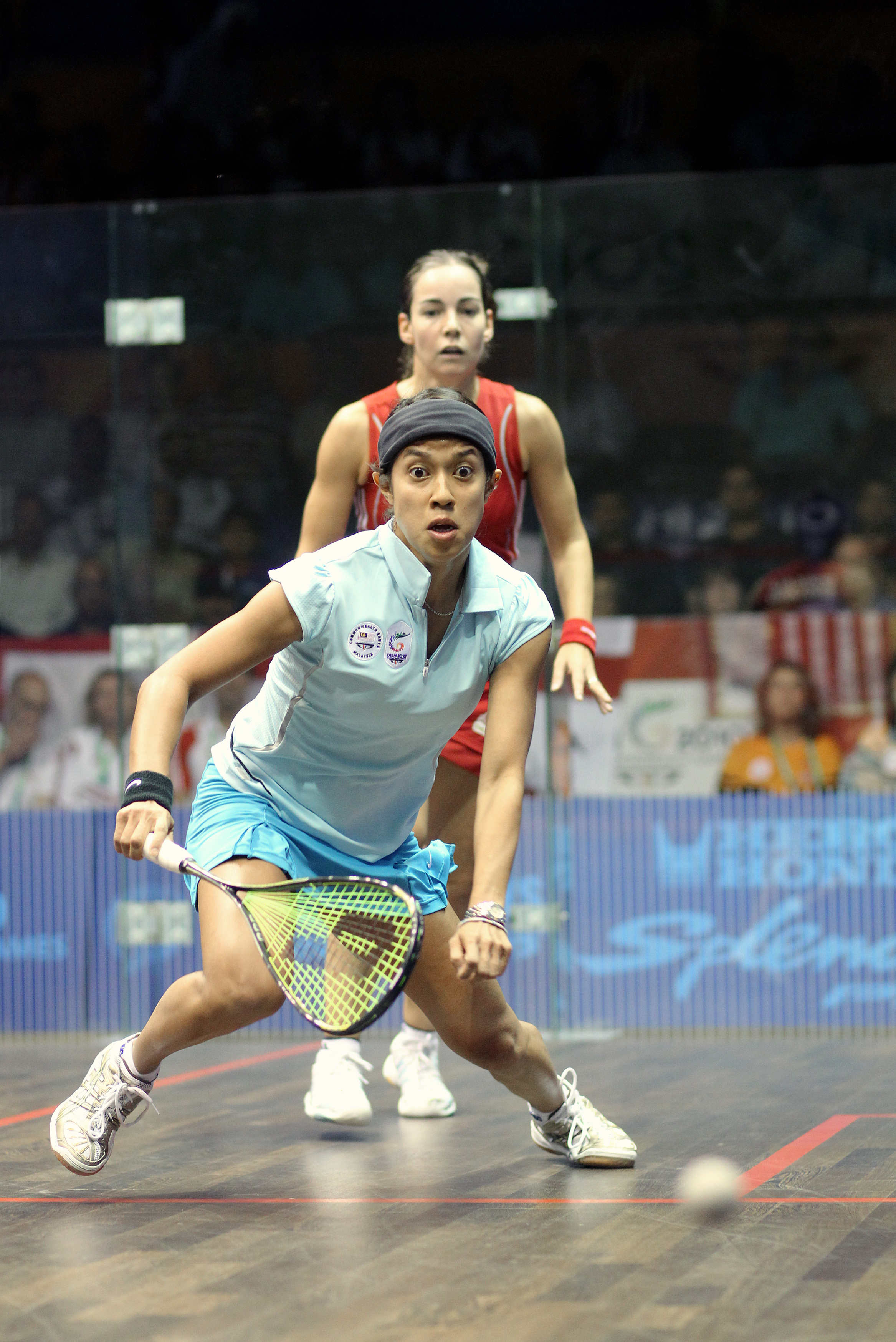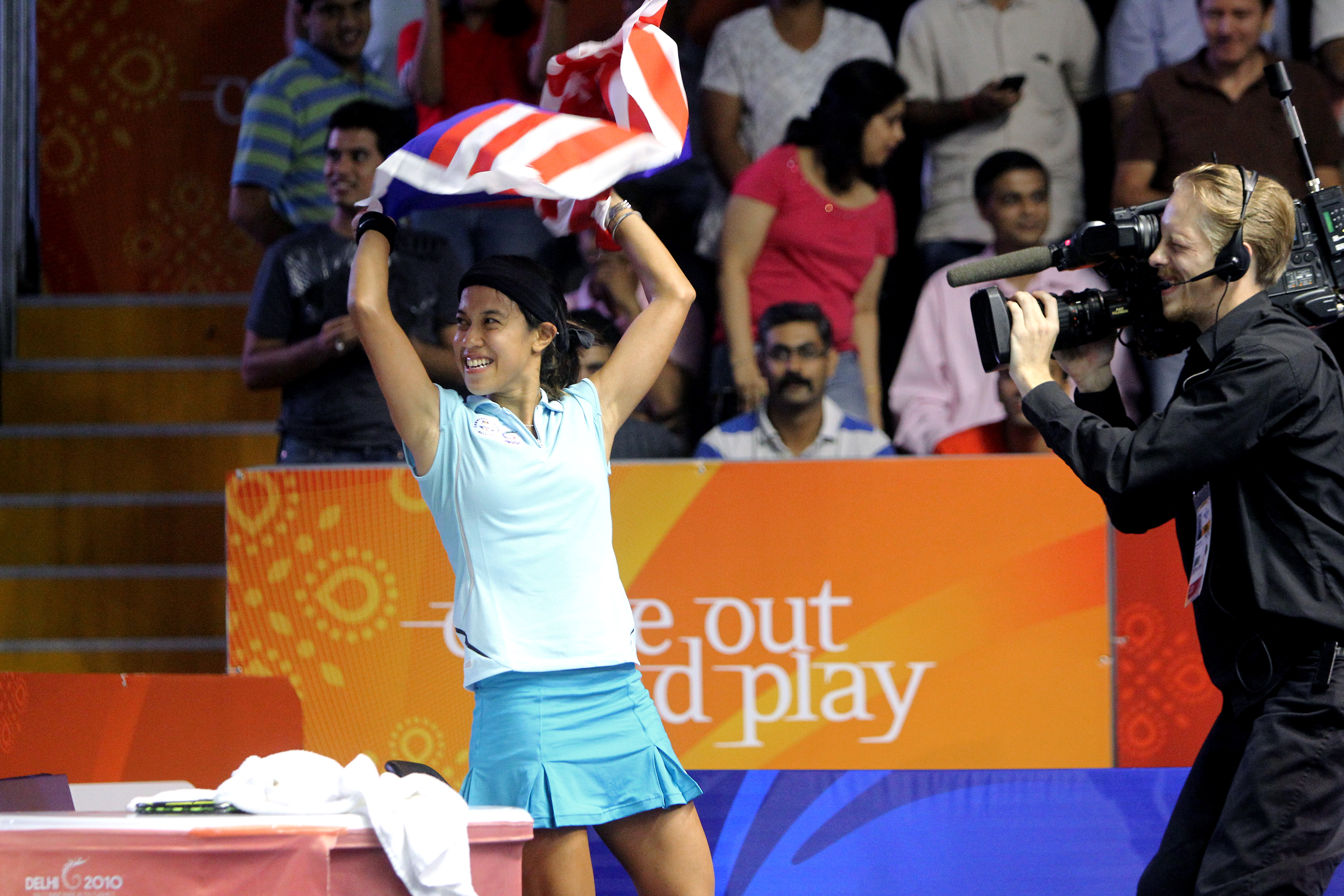
By Richard Eaton
Photos by Steve Line/SquashPics.com
It is an event which many regard as an anachronism—the legacy of a British empire long since dismantled and even longer ago discredited in the eyes of some.
Despite this the Commonwealth Games has been labelled as “Squash’s Olympics” because of the worldwide television it brings and for the multi-sport euphoria which surrounds its winners.
The star of this opulently dazzling but sometimes comically flawed extravaganza in New Delhi in October was Nicol David, who has Indian antecedents and whose gold medal success had several special meanings for her.
Only three weeks previously she was acclaimed for equalling the record of five World Open titles in a stronger field which notably included the Egyptians. But the highly-charged response to her success at the Games dwarfed all that.
David was swamped by her team, enveloped in a giant flag, and hailed as a BRIC country heroine by the Indian crowd. She then fought a harrowingly ecstatic battle with tears as the anthem played.
There were the tributes on Facebook and on Twitter, by e-mail and by text and by mobile, and from parents, friends and fans—and of course from Datuk Sri Mohammed Najib Bin Haji Tun Abdul Razak himself, the prime minister of Malaysia.
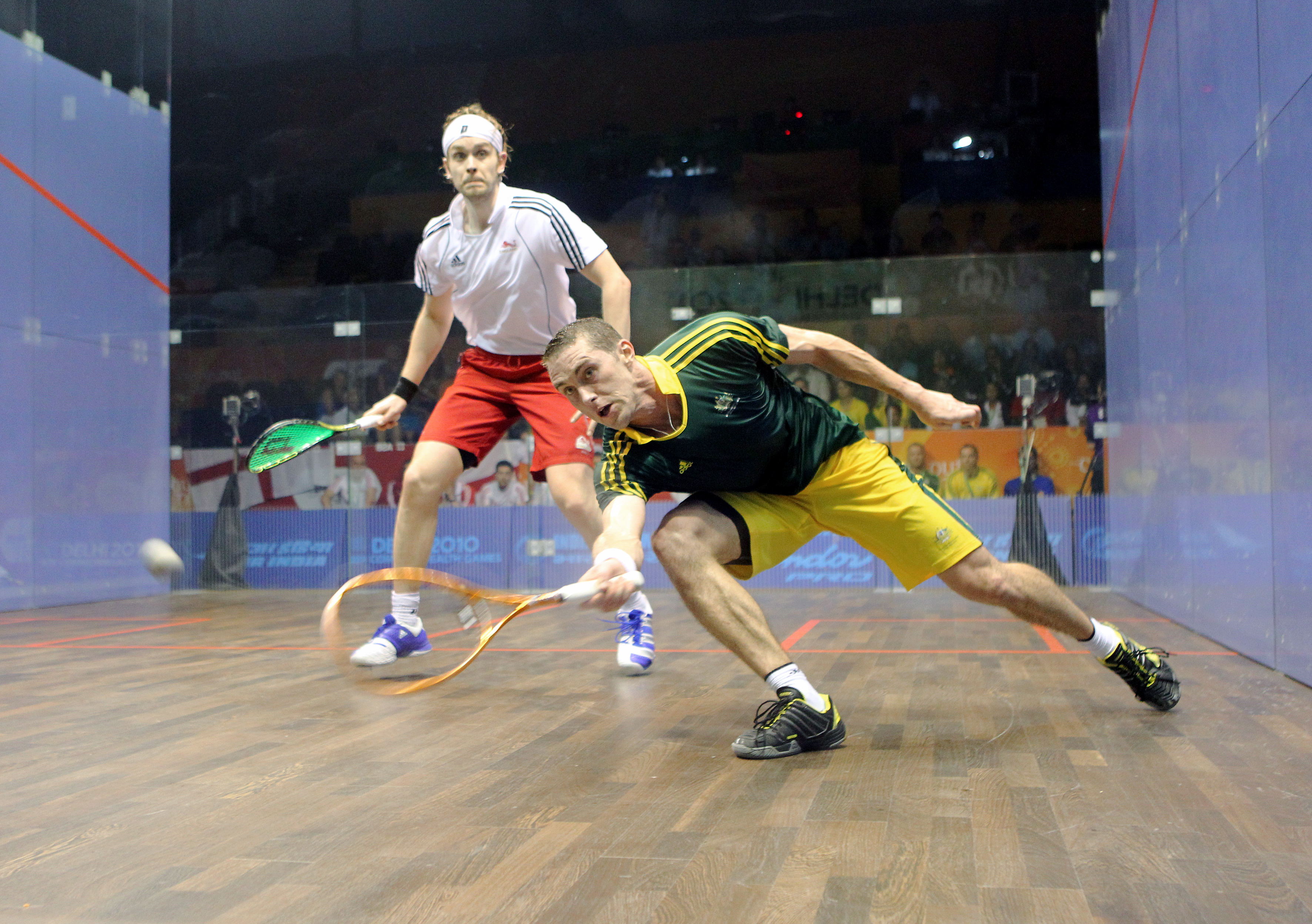
These responses were hugely more triumphal than anything she had had before. So huge, that it can be hard for Westerners to realize just how much David means to millions of people, especially women, all over Asia, or to comprehend fully why the Malaysian is the highest profile squash player of all time.
The only stories that threatened to take away attention from her efforts was when wild rhesus monkeys broke into the athletes village and stole from the rooms. This was followed by 40 grey langur monkeys being hired to chase off their smaller but more pestilential cousins.
But after that there was never much doubt that the heroine designate would gain most of the attention. David was calm, steady, focussed, and more accepting of whatever fate had to offer than she had been before.
And she showed, as she did at Sharm, that she has developed a greater capacity to apply pressure with steady if unspectacular attacking, as well as with the trademark court coverage with which she defends and contains so brilliantly.
Joshna Chinappa, the unseeded but hard-hitting Indian player, came as close as anyone to troubling her, holding a game ball in the second game of a 11-5, 12-10, 11-7 defeat.
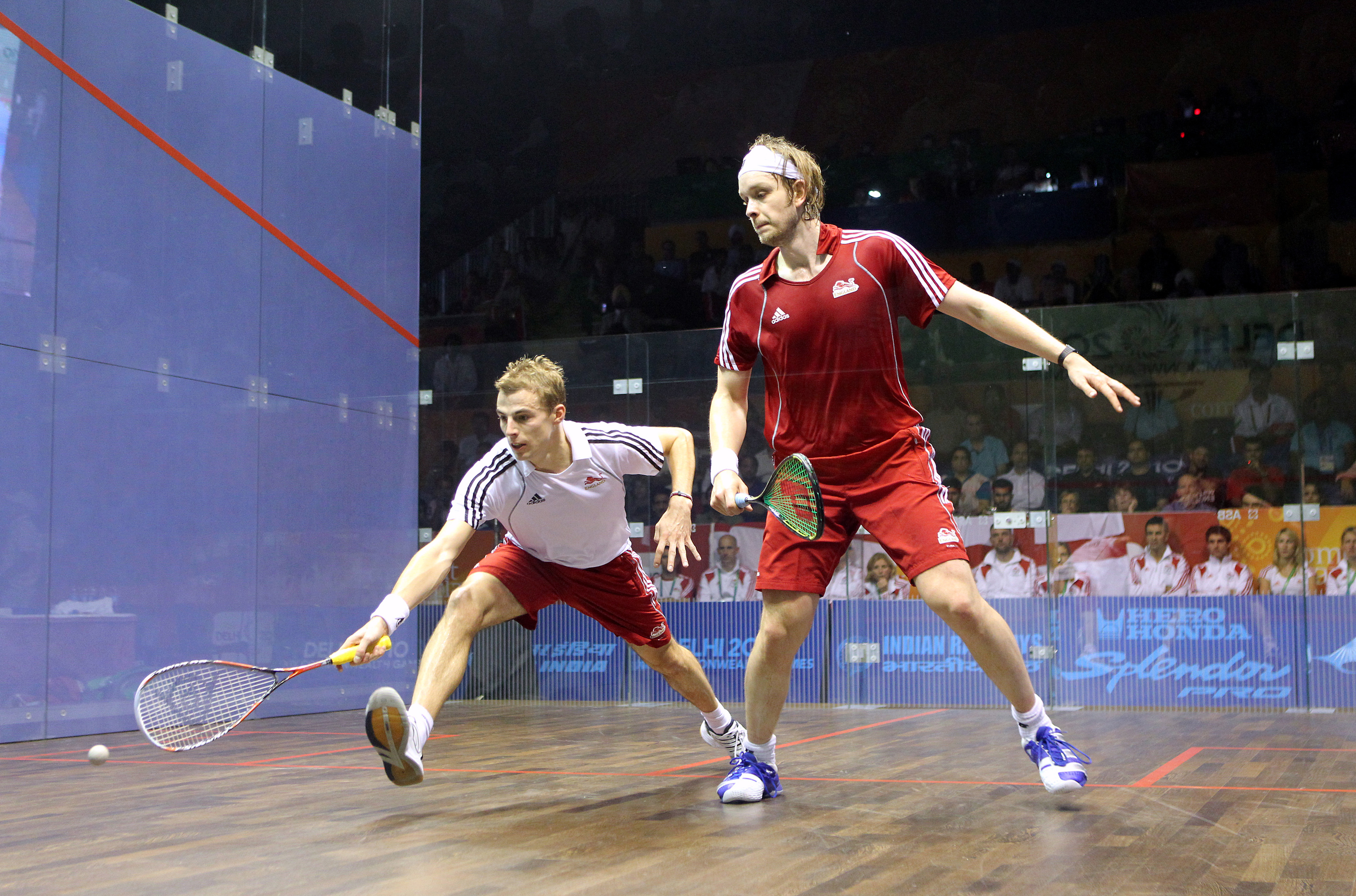
But no-one else really did, even though Jenny Duncalf, the second seed from England, played near her best in the third game of her 11-3, 11-5, 11-7 defeat in the final.
That day a blue rock pigeon and a collared dove found their way into the giant auditorium, swinging in wide ellipses around the high ceiling as if performing their own celebrations.
Asked in what ways she was different from four years ago when she failed to get any medal, David replied: “So much, I can’t even start. Definitely finding myself, and adding a lot of things to my game.
“It was such a turning point at the last Commonwealth Games that I took two steps back to find what I needed to do.”
That is no exaggeration. David’s failure at the 2006 Games changed her career and her life. Feeling the pressure of expectations all too keenly, she lost to Natalie Grinham in the semifinals, and the third place play-off to Shelley Kitchen.
By unhelpful contrast Grinham went on to win three golds—singles, doubles, and mixed—while on honeymoon with the former Dutch champion, Tommy Berden.
These eye-catching successes made David’s effort seem all the more limp, and the resulting criticism confirmed the lady from Penang in a decision to work with Liz Irving 5,000 miles away in Amsterdam.
Now, though, there were no Grinhams. Natalie has since become a Dutch citizen which made her ineligible, whilst the elder Rachael Grinham, the former world champion, has long-lasting differences with Squash Australia and declined to compete for her country.
David in this vein would probably have won anyway, even with the sisters in the field. As at the World Open she trounced all opponents without dropping a game.
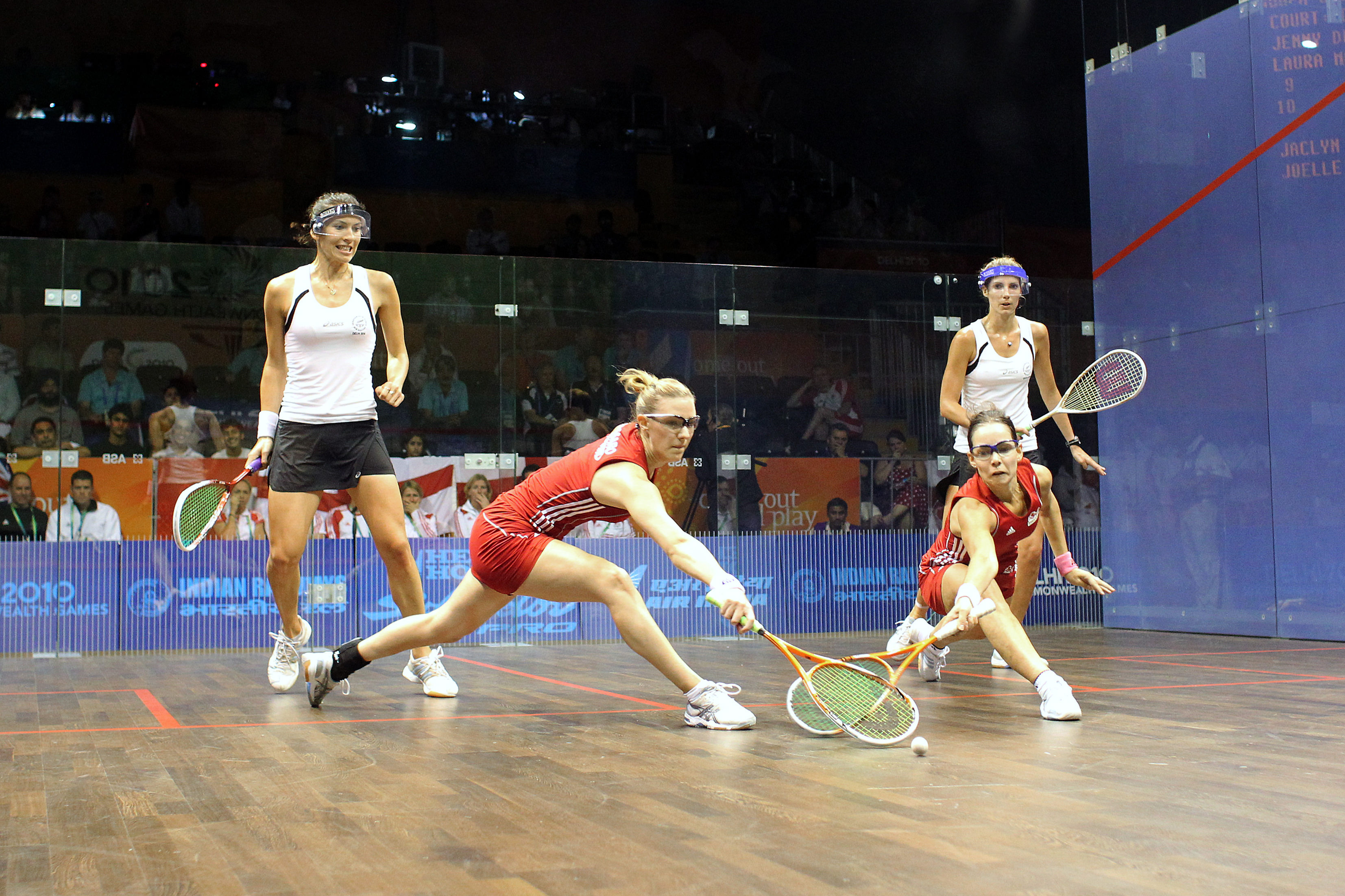
But Kasey Brown was the only squash player to win three medals. The Australian recovered from two games and 5-8 down against Madeline Perry, the British Open runner-up from Ireland, to win 5-11, 6-11, 14-12, 11-9, 12-10, and went on to take the bronze, later winning two doubles medals.
Brown was the tournament’s most notable improver, along with Joelle King, the New Zealander who came within a couple of points of beating the third-seeded Alison Waters and similarly won two doubles medals. It will be surprising if these two women don’t translate this into progress on the WISPA Tour.
The only player to win two gold medals was Nick Matthew, the world number two, who beat his fellow Englishman James Willstrop, in straight games in a disappointing final.
Willstrop had too little fuel in the tank. Much of it had been spent in a contentious quarterfinal with David Palmer, the Miami-based twice former world champion from Australia, who had hopes of following his silver medal in Melbourne in 2006 and his bronze in Manchester in 2002 with a gold in Delhi, just a few weeks before retirement.
But they were destroyed amidst collisions, confusion, and controversy, finishing around midnight. Willstrop was within a few seconds of quitting after lengthy arguments with the referee about whether they should continue or not on a dangerously slippery court, but somehow clawed courageously back from two games down to win 9-11, 8-11, 11-5, 11-8, 11-5.
Palmer got the worst of the decisions and the 34-year-old found his dream receding cruelly amidst bouts of cramp after being within three points of victory at 8-7 in the fourth game.
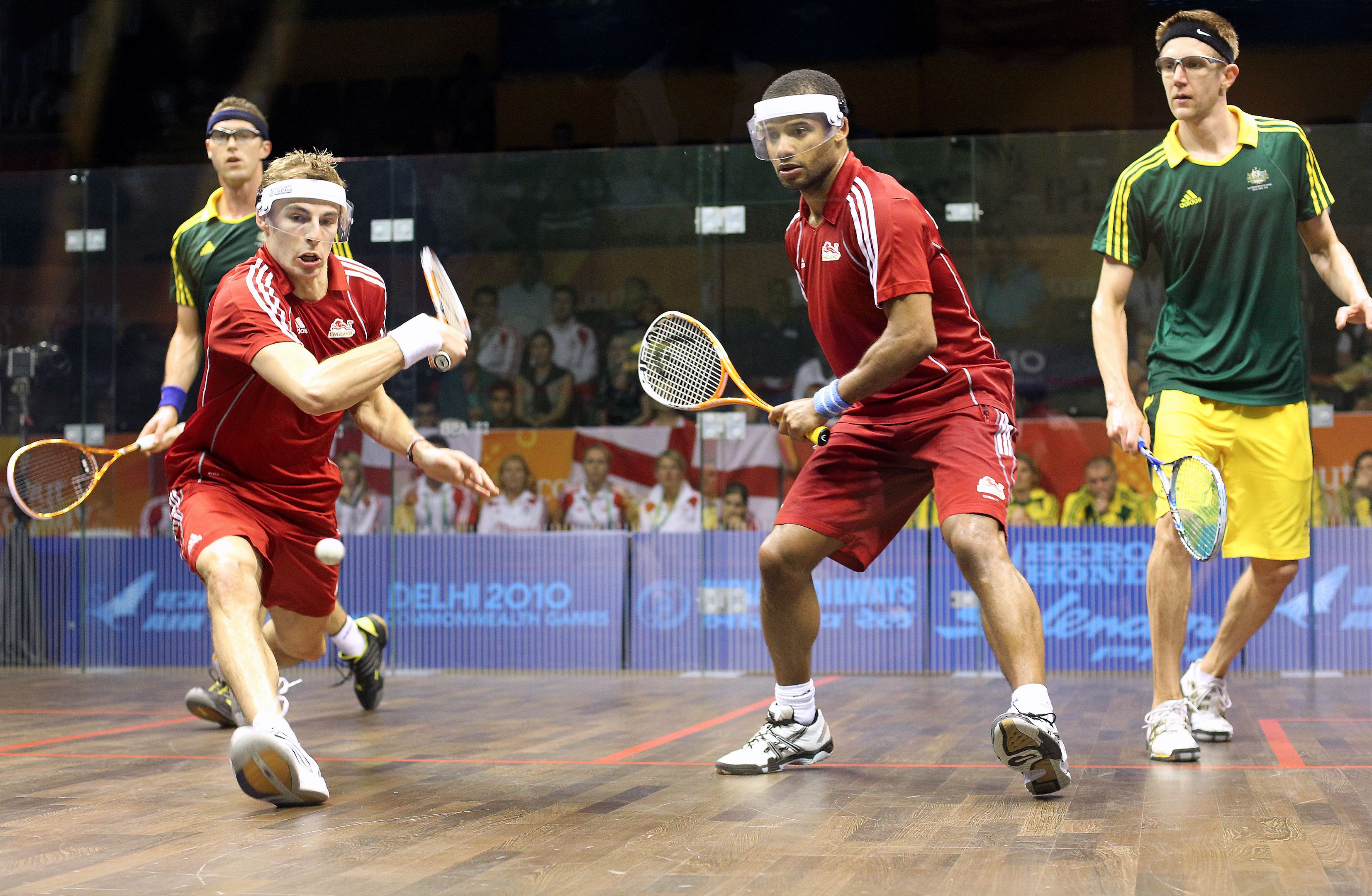
Matthew also won the men’s doubles with Adrian Grant, and although most of the players were thrilled to win medals in this rare form of squash, none of the doubles events can be described as successful.
The rallies were lobotomizing for spectators. Even though the size of a doubles court has been increased, there were few clear patterns in the rallies and no evident tactics to comprehend.
The WSF knows it has a problem here, but doubles are considered to offer opportunities to a wider range of nations and are therefore important for funding.
It underlined the fact that though this may be squash’s “Olympics” it will not be until it gets into the Olympics that the whole world will take notice of squash.

It was heartening therefore that David pledged her services to the sport’s campaign to achieve that—even if it comes too late for her to benefit as a player.
The WSF also regarded it as heartening that Jacques Rogge visited the Siri Fort stadium, the IOC President describing the facilities as “very impressive.”
The Siri Fort was built to repel the Mongol hordes in the 13th century. Now with its $75 million make-over it was again encountering hordes, but this time to welcome them, often from even further afield.
Squash was one of only three sports Rogge visited, perhaps an encouraging sign for the campaign to get squash into the 2020 Olympics, especially as he witnessed TV images which were probably the clearest ever seen from a squash court.
The President of the World Squash Federation, N. “Ramy” Ramachandran, was also encouraged by improvements in high definition television which he said “works 100 percent for squash visibility,” and by some entertaining technological advances with glass floors.
The WSF also received advice from other IOC officials recently on how to improve squash’s chances of succeeding with its next Olympic bid.
“Our discussion was related to our determination that our next bid will have us thinking out of the box, and we will do a study to ensure we achieve that,” Ramachandran asserted.
And if all this eventually reduces the importance of the Commonwealth Games for squash, few would regret the evolution.


